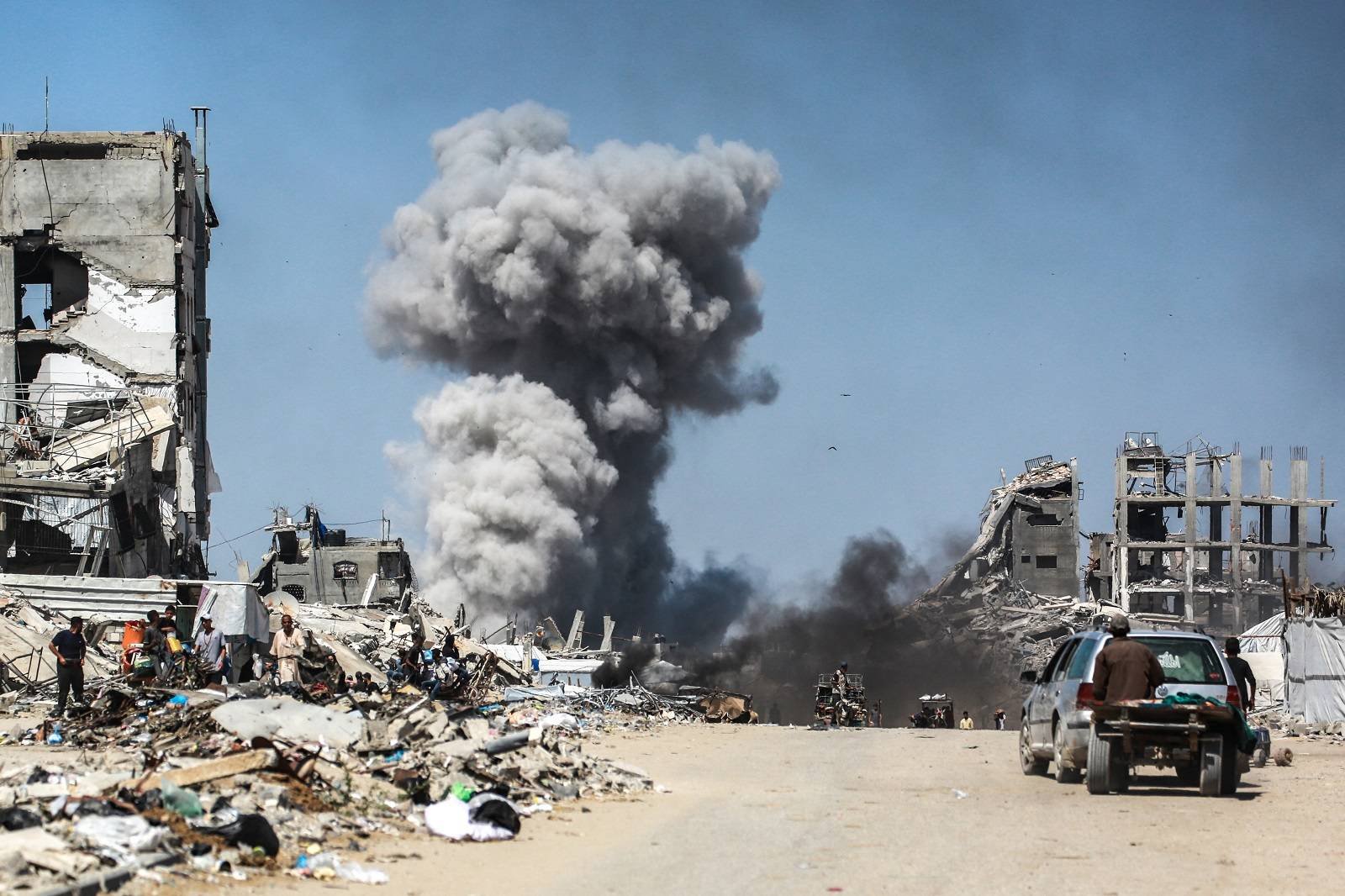Arab and Western collective calls are escalating to end the war in the Gaza Strip, and the call to recognize the state of Palestine, in exchange for an Israeli anger and suggests that this “threatens” the suspended armistice negotiations for nearly a week, and the possibility of the entire occupation of the sector.
That debate, which was reinforced by the declaration of the international conference of the “Two State Solution” headed by Saudi Arabia and France at the United Nations headquarters in New York, will be, according to experts who spoke to “Al -Sharq Al -Awsat”, a compressive and influential aid factor on Washington and Israel to go to an agreement to avoid Arab and Western “pressure”, expecting the return of negotiations.
At the conclusion of the “two -state solution” conference, which came in the presence of a Palestinian and an American absence, the closing declaration called for collective measures to end the war in Gaza, and to achieve a fair, peaceful and permanent settlement of the Israeli -Palestinian conflict, on the basis of effective implementation of the two -state solution, and the call to recognize the Palestinian state.
The statement was signed by the joint presidency of the Saudi conference and France, and the heads of work groups: Brazil, Canada, Egypt, Indonesia, Ireland, Italy, Japan, Jordan, Mexico, Norway, Qatar, Senegal, Spain, Turkey, the United Kingdom, unlike the European Union, and the League of Arab States.
On Tuesday, British Prime Minister Kiir Starmer announced that his country will officially recognize the State of Palestine next September, while French President Emmanuel Macron renewed last week that he confirmed that Paris will formally recognize the State of Palestine at the United Nations General Assembly in New York next September.
British Transport Minister Heidi Alexander, in an interview with LBC radio, called on Wednesday to pressure the Israeli government to cancel the restrictions imposed on the introduction of aid to Gaza, stressing that the British declaration is support for the Palestinian people, not for Hamas.

The counselor at the Al -Ahram Center for Political and Strategic Studies, Dr. Amr Al -Shobaki, believes that possible confessions “will constitute influential and pressing factors on Israel to stop the war in Gaza, and that all Arab moves, especially Saudi Arabia and Egyptian with its western counterpart, constitute auxiliary factors and pressure papers that enhance the path of reaching a truce, but this depends on a decisive role from Washington in influencing Israel.”
The Palestinian political analyst, Nizar Nazzal, believes that what is happening is “Tsantani potential confessions in the State of Palestine that puts Israel under great pressure for the first time in its history to stop the war, especially the talk of Britain, which had a long history in establishing that Israeli entity”, believing that “the wave of the wave of those confessions will be very large on Israel, and will pay positively to a truce in Gaza, and will be a factor of assistance to reach that.”
On the other hand, the Israeli Ministry of Foreign Affairs said, in a post on the “X” website, on Tuesday, that Britain’s plans to recognize a Palestinian state in September “would harm the efforts to reach a ceasefire in the Gaza Strip.”
22 ministers and deputy coalitions in the ruling coalition in Israel, including the Minister of National Security, Itetar bin Ghafir, asked the Minister of Defense Yisrael Katz on Wednesday to allow them to take a tour in northern Gaza as part of the preparation of plans for the re -occupation of the Strip, according to the Israeli “12 Channel”.
While the Israeli Minister of Heritage, Amihai Eliao, called for “the complete occupation of Gaza,” stressing “the importance of destroying the Hamas movement, and that the liberation of the hostages is not a priority now.”
Israeli Prime Minister Benjamin Netanyahu said on Tuesday that Israel is continuing its efforts to release the hostages detained by Hamas in Gaza, despite the “refusal” of the movement, according to Reuters news agency.

About a week ago, Israel and its ally, America, announced that their teams were withdrawn from the Doha negotiations that started on July 6, to consult, amid waving use of alternative plans to liberate hostages from prominent officials of the two countries, such as US President Donald Trump and his Middle East envoy Steve Whizov, alongside Netanyahu.
On the other hand, the Qatari Foreign Minister, Sheikh Muhammad bin Abdul Rahman Al Thani, confirmed in statements, on Wednesday, that the endeavors are continuing to reach an immediate ceasefire in Gaza.
The Egyptian Foreign Minister, Bader Abdel -Ati, discussed during a visit to Washington, on Wednesday, Egypt’s efforts to reach a truce agreement, during interviews with a number of members of the Senate, most notably Lindsay Graham, according to a statement by the “Egyptian Foreign Ministry”.
Al -Shobaki believes that what Israel states is merely “mutual pressures and part of the debate, especially as it feels that they are fortified and above the international legal and are seriously planning to occupy new parts of Gaza, not all of Gaza,” noting that the continuous efforts of the brokers confirm that there is an opportunity to cease fire in the Strip if the American side is convinced of the need to exert pressure on Netanyahu.
Nazzal believes that these successive Israeli statements are “an attempt to escape forward from the escalating Arab and Western pressure, and Israel has surprised us with a joint military operation with Washington to liberate the hostages, and if it fails, it will go to a truce”, expecting the return of negotiations and reaching an agreement soon due to the Egyptian -Qatari movement, and the failure of American and Israeli negotiating tactics.



